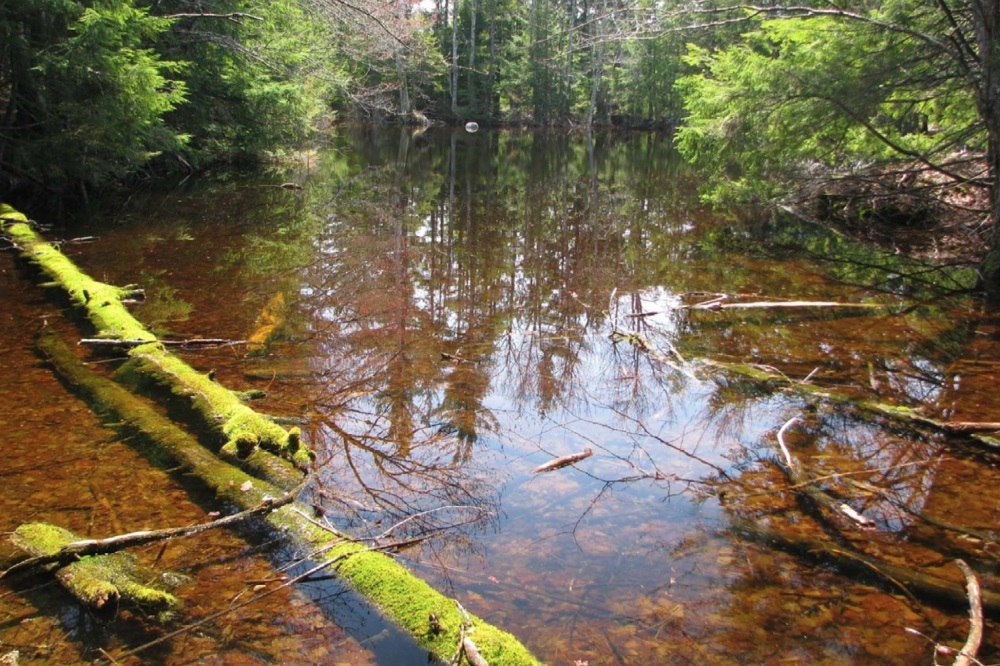SCORES & OUTDOORS – Vernal pools: valuable small bodies of water

A vernal pool in Maine. (photo from the University of Maine, vernalpools.me)
 by Roland D. Hallee
by Roland D. Hallee
We talked about vernal pools several years ago, but I think it’s time to visit the subject again.
Vernal pools are seasonal pools of water that provide habitat for distinctive plants and animals. They are considered to be a distinctive type of wetland usually devoid of fish, and thus allow the safe development of natal amphibian and insect species unable to withstand competition or predation by fish.
Typically, a vernal pool has three phases each year: it is inundated in the winter, dries slowly in the spring, and completely dries in summer.
Vernal pools favor native species because non-natives can’t handle the conditions of the water staying on the landscape for as long as it does, but not long enough to support truly aquatic species.
A key formation of the vernal pools is due to the impermeable layer. Clay soils bind closely together and become inpermeable to water. When it rains the water percolates until it reaches the claypan and sits there, filling up with material and water.
Vernal pools can form anywhere that a depression fills with water. They can be found on bedrock of many kinds, or in grasslands that form over a variety of soil types containing silts and clays.
Vernal pools are so called because they are often, though not necessarily, as their maximum depth in the spring. Vernal means, of, relating to, or occurring in the spring. Vernal pools may form in forests, but they are more typically associated with grasslands and rocky plains or basins.
Despite being dry at times, vernal pools teem with life when filled. The most obvious inhabitants are various species of breeding frogs and toads. Some salamanders also utilize vernal pools for reproduction, but the adults may visit the pool only briefly. Other notable inhabitants are daphnia and fairy shrimp, the latter often used as an indicator species to decisively define a vernal pool. Other indicator species, at least in New England, are the wood frog, the spadefoot toad and some species of mole salamanders.
The major threats to vernal pool habitats are agriculture, urbanization, changes in hydrology, climate change and improperly managed grazing by livestock.
Therefore, in some areas, there are restoration efforts underway.
Vernal pools are prime habitats to be targeted for restoration work due to their value as hotpots of biodiversity as well as recent history of extensive destruction and degradation.
There has been a fair amount of controversy surrounding the practice of mitigation, which is the destruction of protected or endangered species and habitats, such as vernal pools, on the condition that whatever entity (business, land manager, etc.) is destroying the habitat will undertake the construction of a replacement habitat to “mitigate’ their impacts. This concept is difficult to apply to vernal pools, which represent a tremendous habitat value – but are difficult to successfully replicate using construction methods. Thus, it has been very controversial to apply mitigation strategies to vernal pool systems due to the obvious risks inherent in trying to reconstruct this kind of habitat. Although some agencies are now requiring two replacements for every vernal pool that is destroyed, in order to compensate for the low quality of man-made habitat.
With natural wildlife habitat threatened on daily basis, it is important to remember, and take into account, the value of these small bodies of water.
Roland’s trivia question of the week:
At the 2010 All-Star game, who became the only Red Sox player to win a home run derby by defeating Hanley Ramirez in the final?
Responsible journalism is hard work!
It is also expensive!
If you enjoy reading The Town Line and the good news we bring you each week, would you consider a donation to help us continue the work we’re doing?
The Town Line is a 501(c)(3) nonprofit private foundation, and all donations are tax deductible under the Internal Revenue Service code.
To help, please visit our online donation page or mail a check payable to The Town Line, PO Box 89, South China, ME 04358. Your contribution is appreciated!


Leave a Reply
Want to join the discussion?Feel free to contribute!